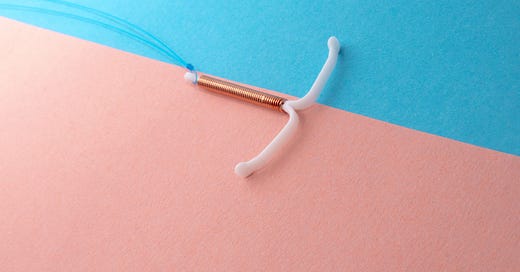Calling Out Medical Gaslighting
In medical settings, it is common for women’s pain to be ignored or dismissed. Why?
This article from the NYT on the unnecessary and horrific levels of pain too many women are expected to endure while getting an IUD inserted, is frankly, infuriating. It reports that about 20 percent of women relied on an IUD between 2015 and 2019, up from the 8 percent who used one between 2006 and 2010.
But an IUD insertion is still excruciatingly painful even though it’s so common. A survey published this year found that only 4 percent of trained physicians in the United States offered an injection of a local anesthetic, which has been found to be effective for pain relief, but almost 80 percent of trained doctors, offered over-the-counter painkillers, like ibuprofen, which have been shown to be less effective.
So what is the problem? Why is it so hard to believe women? Why is our cultural tolerance for women's suffering so high, still?
During the research for my book, The Pain Gap, I spoke with hundreds of women who had stories of their pain and symptoms in ignored at dangerous or even deadly levels. The research backs us:
Women and Black adults wait 11 minutes longer to be seen in the emergency room for chest pain, according to a 2022 Journal of the American Heart Association (JAMA) study.
A 2021 study published by the Journal of Pain entitled, "Gender biases in estimation of others' pain," confirms what many women already know: Patient's pain responses may be perceived differently by others based on their gender.
The study found that when male and female patients expressed the same amount of pain, observers viewed female patients' pain as less intense and more likely to benefit from psychotherapy, versus medication as compared to men's pain, exposing a significant patient gender bias that can lead to disparities in treatment.
When it comes to women’s health and bodies, it is not just “in our heads.” We are not passive beings acting “hysterical.”
Across the spectrum, our medical concerns are dismissed more often than men's, and this medical gaslighting of women needs to end.
Let’s start taking their complaints seriously. We must believe, treat and diagnose their pain. It’s the first and crucial step in closing the pain gap in #womenshealth.





